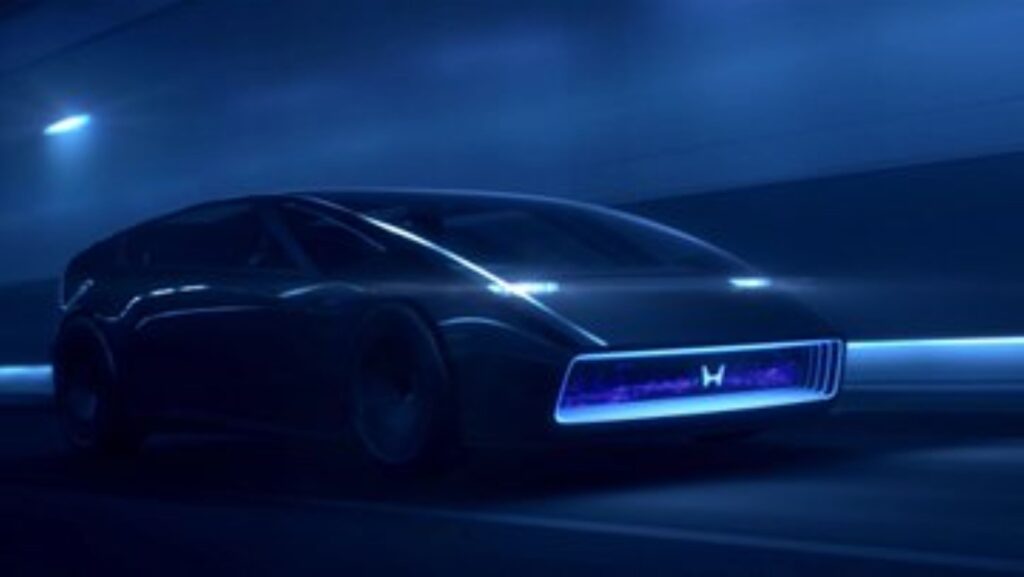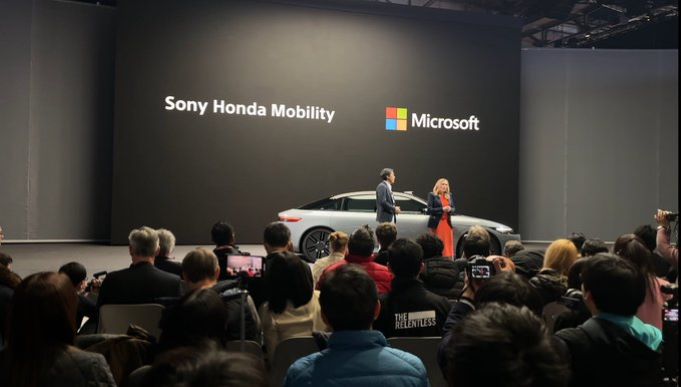Honda has announced a new global electric vehicle series, called Honda Zero, presenting it as an alternative to the growing trend of heavy electric vehicles entering the market. Honda says it will introduce its first model, based on a sleek, sedan-like concept named the Saloon, starting in North America in 2026.
Today at #CES2024 we debuted the “Honda 0 Series" EV concept models, Saloon and Space-Hub. #Honda0 https://t.co/p7pvpXfnRg pic.twitter.com/Ij7gHCqYtL
— Honda (@Honda) January 9, 2024
Alongside the Saloon, Honda unveiled a more squared and van-like concept named the Space-Hub. The concepts are intended to demonstrate Honda’s lighter approach to EV development, riding atop a thin vehicle architecture with a low floor designed to enhance aerodynamics.
NEWS: Honda says it's launching a new global line of dedicated EVs starting in 2026.
— Sawyer Merritt (@SawyerMerritt) January 9, 2024
They unveiled two new concepts today under the Honda 0 Series (video below): The Saloon and Space-Hub. A production car based on the Saloon concept will be available in North America in 2026. pic.twitter.com/Wml8ydHIkE
Honda says “thin” and “light” are two of the three principles, the third being “wise,” guiding the development of the Honda Zero EV series. The automaker stressed a clean-sheet engineering approach for the lineup, including a new H-mark logo that will be exclusive to its next-generation electric vehicles.
How exactly Honda plans to achieve this new lightweight design in its future EVs is still unknown. Many electric vehicles currently entering the US market are large, heavy SUVs and trucks, following broader car purchasing trends that have led some companies to stop producing sedans. However, Honda seems to suggest there is another way, particularly for smaller, slimmer, and lighter vehicles.


Of course, Honda is also partnered with Sony on the design and development of the latter’s Afeela electric vehicle, which was first introduced at CES last year. The Afeela is also expected to reach the North American market by 2026, though details regarding its connection, if any, to the Honda Zero lineup have not been disclosed.

The Saloon has a sloping fastback shape with unique rectangular headlights and taillights resembling a vintage Black & Decker Dustbuster. The vehicle appears to ride extremely low to the ground for an overall sporty performance inspired by Formula 1 racing. Inside, simplicity reigns. Think Tron vibes – minimal, with cool lighting touches, a solitary central display, and wheels sporting pixelated covers, creating an intriguing glimpse through the darkness.

The Space-Hub resembles a minivan with minimal overhangs and rear lights similar in appearance to Rivian’s electric delivery vans for Amazon. The Space-Hub will also include a huge panoramic moonroof curving over the sides to create an almost greenhouse-like effect inside. There are two front-facing bench seats, suggesting autonomous shuttle services could be a potential future use case. There is no rear window, meaning drivers will likely need to rely on cameras to see out back.

No real specifications have been released, but Honda says these future electric vehicles will offer both partial and fully autonomous capabilities depending on the configuration. A marketing video featured a retractable steering wheel that emerges from the dash when needed, implying customers will be able to toggle between manual and automated driving as preferred.
The advanced driver-assist features will be based on Honda’s Sensing platform, which debuted in the Honda Legend in Japan in 2021. Honda Sensing is a Level 2 system, meaning drivers still need to pay attention to the road and are legally responsible for vehicle operation. Hands-free driving on “expressways and surface streets” will be available starting in the mid-2020s, including in more affordable models, according to the company.
The Honda Zero series will have a sporty character, borrowing performance-enabling designs from the automaker’s Formula 1 racing experience. Honda is also aiming for optimal battery efficiency through its use of e-Axles, a system consisting of an electric motor, inverter, and gearbox that converts electric power to energy for driving.
Check out our flagship EV concept model, Saloon. Both sporty and spacious. #CES2024 #Honda0 pic.twitter.com/sbwXvYnqWM
— Honda (@Honda) January 9, 2024
Like several other automakers, Honda plans to introduce more AI-powered features in its future lineup of vehicles. These features will collect driver preference data to offer a more personalized experience and make route suggestions based on location information.

So far, Honda’s global EV offerings have been limited. There’s the Honda e city car, only available in Europe and Asia and set to be discontinued this year, and the upcoming Prolog SUV for the North American market.
There’s also the upcoming Acura ZDX from the company’s performance brand. Overall, Honda aims for 30 new electric vehicles by 2030 with 2 million units sold, 100 percent zero-emission vehicle sales by 2040, and carbon neutrality for all corporate activities and products by 2050.
But there have also been setbacks. Honda recently canceled plans to build an affordable EV lineup with General Motors. Cruise, the self-driving unit of GM with Honda as an investor, stopped all public operations after one of its driverless cars injured a pedestrian.
